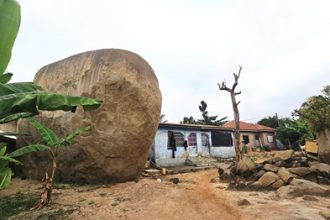In the heat of battle, on August 7, 1826, in the confusion, the Golden Stool was temporarily abandoned, and got into the possession of the enemy.
Instinctively, Antwi Panin, the Chief of Kuntenase mounted a recovery team to retrieve the Golden Stool. He was joined by Juabenhene Daasebre Kwasi Boateng, they succeeded in recovering the stool from the enemy who as was reported, were “gazing at it frightfully,” unable to comprehend what it was…”
According to W. Walton Claridge’s book “A History of the Gold Coast and Ashanti,” published in 1885,” based on interactions and interviews with people who took part in that war. The two Asante Chiefs received a great ovation when they returned with the Golden Stool.
The Juabenhene was accorded the accolade “OWOROKOMA,” that is, one upon whom the nation depends to fight in the heat of battle, the dependable one in battle. Nana Antwi Panin, the Kuntenasehene, received thirty-nine bullet shots, but he survived the ordeal and so that earned him the accolade “OGYEABUO”, that, is, he who receives, yet, repulses bullets.
The Juabenhene surrendered the Stool to Asantehene Osei Yaw Akoto on Asante territory in the ancient town of Sewua. Again, the Asantehene and Kumasi Abrempong accused Nana Juabenhene of keeping to himself, a box containing gold dust. The desecration of “Sikadwa” is an unspeakable crime, to which Juabenhene Akwasi Boateng took serious offense, and vehemently denied.
Matters came to a head-on when both the Juabenhene and Asantehene supported rival candidates in the succession to the Nsuta Stool following the death of Nsutahene Yaw Osekyere (Yaw Sekyere), who died on the battlefield at Akatamanso War.
The upshot was that the candidate supported by Juabenhene were murdered in cold blood on their way to Kumasi, and up to date, nobody knows who committed such an unspeakable crime. Nana Juabenhene was peeved at what he described as treachery and accused Kumasi, he never forgot that.
So, when a bosom friend of Juabenhene by the name of Kotiako, sought asylum in Kumasi after he was accused by a wife of Juabenhene for taking liberties with Juabenhene’s wives, added fire to the already tense situation.
The Kotiako case also led the Juabenhene to declare, after Kumasi forces lined up against Juaben, “Sɛ brebre amma a, anka amaneɛ nso amma, Kotiako na me ne no wo asɛm….” is the immediate cause for the war between Juaben and Kumasi, that led to the 1832 migration of mainly Juaben people to Akyem Abuakwa.
However, after the death of Osei Yaw Akoto, the Juaben people returned after being assured of peaceful relations by the new Asantehene Kwaku Dua Agyeman.
Young teenager Yaw Sarpong became Juabenhene.
And, that completed the formation of New Juaben as a separate “Paramountcy” in addition to ‘Old’ Juaben. The late Omanhene of New Juaben, Daasebre Oti Boateng, and Daasebre Otuo Siriboe, Omanhene of Asante Juaben are brothers from the same mother, as is Nana Juabenhemaa of Asante Juaben.
Some of the Juaben immigrants also founded towns such as
Enyiresi, Kankang, Asaaman, etc, in Akyem Abuakwa itself. These towns owed allegiance to Juaben. In the 1920s, Akyem Abuakwahene Ofori Atta I appealed to the British colonial government to change that. Allegiance of the Juaben towns in Akyem Abuakwa and Akyem Kotoku were then transferred to the respective paramount chiefs.
New Juaben does not swear allegiance to Otumfuo Asantehene. As we say in Asante, New Juabenhene ‘di ne nkui.” New Juaben refers to the Asantehene as his Elder Brother. People of New Juaben are 100% Asantes .
Author: Sankofa Asante ( a walking encyclopedia of Asante History
















